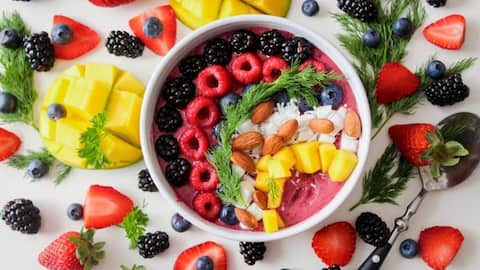Foods to raise good cholesterol levels naturally
What's the story
Cholesterol, a vital component of cell membranes and hormone production, exists in two primary forms: low-density lipoprotein (LDL) and high-density lipoprotein (HDL). While high LDL cholesterol levels can pose health risks, HDL cholesterol is considered beneficial. HDL helps transport cholesterol to the liver for processing and elimination. Incorporating specific foods into a diet can help raise HDL cholesterol levels, promoting cardiovascular health.
Fiber
Avocados
Avocados are renowned for their high content of monounsaturated fats, which can boost HDL cholesterol while lowering LDL cholesterol levels. Additionally, avocados provide fiber, potassium, and various vitamins that support overall heart health. Incorporating avocado slices into sandwiches, making guacamole, or simply spreading avocado on toast are easy and nutritious ways to enjoy this fruit's benefits.
Healthy fats
Nuts
Nuts, including almonds, walnuts, and pistachios, are excellent sources of healthy fats, fiber, and plant sterols. These components contribute to increased HDL cholesterol levels and have been associated with reduced inflammation and improved cholesterol profiles. Snacking on a handful of nuts, adding them to oatmeal, or using them as toppings for yogurt are convenient ways to incorporate them into your daily diet.
Protein
Legumes
Legumes such as lentils, chickpeas, and beans are excellent additions to a heart-healthy diet. Rich in soluble fiber, legumes can effectively lower LDL cholesterol levels. Soluble fiber binds to cholesterol in the digestive tract, preventing its absorption into the bloodstream and promoting its elimination from the body. Additionally, legumes are valuable sources of plant-based protein, making them a nutritious alternative to animal proteins.
Polyphenols
Berries
Berries like blueberries, strawberries, and raspberries are rich sources of fiber, antioxidants, and polyphenols. They contain flavonoids such as anthocyanins, which are known for their ability to reduce oxidative stress and inflammation. Incorporating berries into your diet by enjoying them with breakfast cereal, blending them into smoothies, or simply savoring them as a healthy dessert can help you reap their heart-healthy benefits.
Oleic acid
Olive oil
Extra virgin olive oil, a key component of the Mediterranean diet, is abundant in monounsaturated fats, particularly oleic acid. This has the potential to elevate HDL cholesterol levels while mitigating the oxidation of LDL cholesterol. Incorporating extra virgin olive oil into salad dressings, drizzling it over vegetables, or using it for cooking in place of other oils can deliver substantial cardiovascular advantages.
